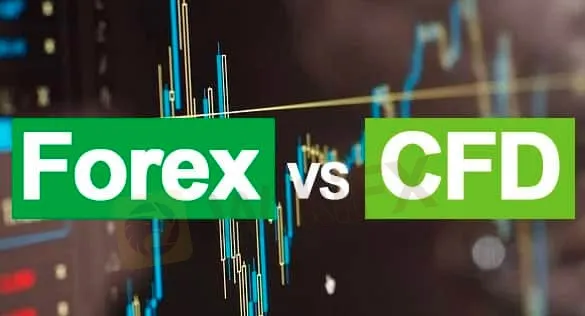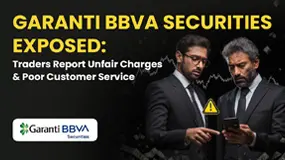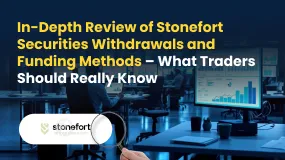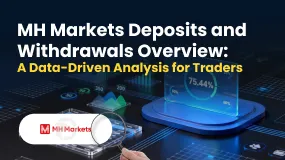简体中文
繁體中文
English
Pусский
日本語
ภาษาไทย
Tiếng Việt
Bahasa Indonesia
Español
हिन्दी
Filippiiniläinen
Français
Deutsch
Português
Türkçe
한국어
العربية
What Is the Distinction Between Forex and CFD Trading?
Abstract:However, it can be difficult to fully comprehend the benefits and drawbacks of investing in and trading CFDs, especially for traders who are just starting out. In this article, we will look at the CFD trading principle, as well as the similarities and differences between Forex and CFD.
Click Here: After you read it, Daily Routine with WikiFx visit IC website
CFD and forex trading are popular among traders due to their large leverage. Currency exchange is the world's oldest form of trading, dating back thousands of years, while CFDs are a relatively new market, dating back only about 20 years.
Investing in and trading CFDs has its benefits and drawbacks, especially for new traders. In this post, we will compare and contrast CFD trading with Forex trading.
So, CFD?
A CFD is a contract between a buyer and a seller that says that the buyer must pay the seller the difference between the current value of an asset and its value at contract time.
This type of investing gives for a lot of freedom. Traditionally, you acquire an asset hoping for it to go higher. With CFD trading, your options are significantly broader. When you buy the contract, you can speculate on price changes.
Every point the instrument's price moves in your favor is multiplied by the amount of CFD units you bought or sold. You lose money every time the price moves against you.
CFDs and Forex: Comparative Analysis
While there are some similarities and overlaps between these two markets, they are vastly distinct. Whereas Forex focuses on trading currency pairings, CFDs offer a variety of trading choices.

CFDs and Forex Identicals
Leverage
Forex and CFD trading are both leveraged. This allows traders to open positions larger than their capital can normally support.
This is because brokers provide extra capital in the form of leverage for every trade made on a forex or CFD platform.
2. Avoid physical asset transfers
CFD and forex trading avoid physical asset transfers. You can buy them both over the counter (OTC) and trade them through a network of financial institutions. Their trades are usually executed similarly.
3. Long or short?
You can trade long or short in both markets. Trading forex and CFDs has this specific edge. Any direction is possible for traders to speculate. These markets are exceedingly volatile. If you think the financial asset will do well, you can acquire it. If not, you expect the asset to depreciate, allowing you to sell short.
4. Fee
The only cost of trading CFDs and Forex is the spread, unlike other trading instruments that impose commissions and other finance fees.
CFD vs Forex differences
1. Base assets
The fundamental distinction between Forex and CFD trading is that Forex is purely currency-based, whereas CFDs include a wide range of markets, including indices, metals, and energy. FX trading involves trading one currency against another in pairs and in consistent lot sizes.
2. Time swaps
CFD trading does not follow the famed “24/7” FX trading methodology (which only means that trades can be made 24 hours a day throughout the work week). Instead, CFDs are constrained by the market's trading hours.
4. Economic Factors
Diverse factors affect both markets. The currency market is heavily influenced by global macroeconomic events and forces. There are several elements that can affect the global economy such as substantial swings in employment, risk attitude, monetary policy expectations and their impact on GDP, international political upheavals and even environmental problems.
The CFD market's price swings, on the other hand, are influenced by the instrument's individual variables. For example, supply and demand for a given commodity can alter over time.
Cons of CFD Trading
Prons:
1. More markets reachable
The most essential one is that the CFD market opens up a new world of options beyond the Forex market. And all on the same trading account.
Gain from market declines
Instead of buying contracts, you sell them to open a short CFD position. Then you buy the equal number of CFDs to settle your trade.
This allows you to profit when markets decline, adding another dimension to your trade.
3. Leverage trading
CFDs allow leveraged trading. This enables you to control a larger stake with less capital. Some stocks barely move, so you won't make much money unless you invest a lot of money. Leverage allows you to profit from modest market moves. Obviously, this adds danger, which I discuss in the disadvantages.
Cons:
1. You may lose all your money.
Inflation is unusual. Stocks also tend to bounce back following losses. In CFD trading, if your position falls below a specific level, it closes. No hope of recovery.
Margin Requirements
Unlike other forms of leveraged trading like forex, the broker sets the margin requirements for each market. This can hinder your larger trading plan and add an extra layer of planning to the pre-trade process to examine the feasibility of a prospective return.
3. Overtrading is easy.
The rapidity of CFD trading makes it simple to overtrade. Overtrading is a common rookie mistake. And I see that all the time on CFD platforms. Traders who lack emotional control can easily keep opening positions or worse, closing positions for small profits. Big blunders.
Conclusion
Forex and CFDs are both popular trading choices that can be profitable when handled properly. Both interesting trading opportunities have benefits and drawbacks. Knowing the differences between CFDs and FX might help investors make smarter trading decisions. It is possible to use both, but for beginners, it is best to stick to one or the other.
Disclaimer:
The views in this article only represent the author's personal views, and do not constitute investment advice on this platform. This platform does not guarantee the accuracy, completeness and timeliness of the information in the article, and will not be liable for any loss caused by the use of or reliance on the information in the article.
Read more

Garanti BBVA Securities Exposed: Traders Report Unfair Charges & Poor Customer Service
Have you been financially ruined through chargebacks allowed by Garanti BBVA Securities? Do you have to wait for hours to get your queries resolved by the broker’s customer support official? Did the same scenario prevail when you contact the officials in-person? Failed to close your account as Garanti BBVA Securities officials remained unresponsive to your calls? Many have expressed similar concerns while sharing the Garanti BBVA Securities review online. In this article, we have shared some complaints against the broker. Take a look!

In-Depth Review of Stonefort Securities Withdrawals and Funding Methods – What Traders Should Really
For any experienced forex and CFD trader, the mechanics of moving capital are as critical as the trading strategy itself. The efficiency, security, and transparency of a broker's funding procedures form the bedrock of a trustworthy, long-term trading relationship. A broker can offer the tightest spreads and the most advanced platform, but if depositing funds is cumbersome or withdrawing profits is a battle, all other advantages become moot. This review provides a data-driven examination of Stonefort Securities withdrawals and funding methods. We will dissect the available information on payment options, processing times, associated costs, and the real-world user experience. Our analysis is anchored primarily in data from the global broker regulatory inquiry platform, WikiFX, supplemented by a critical look at publicly available information to provide a comprehensive and unbiased perspective for traders evaluating this broker.

MH Markets Deposits and Withdrawals Overview: A Data-Driven Analysis for Traders
For any experienced trader, the integrity of a broker is not just measured by its spreads or platform stability, but by the efficiency and reliability of its financial plumbing. The ability to deposit and, more importantly, withdraw capital without friction is a cornerstone of trust. This review provides an in-depth, data-driven analysis of the MH Markets deposits and withdrawals overview, examining the entire fund management lifecycle—from funding methods and processing speeds to fees and potential obstacles. MH Markets, operating for 5-10 years under the name Mohicans Markets (Ltd), has established a global footprint. With a WikiFX score of 7.08/10, it positions itself as a multi-asset broker offering a range of account types and access to the popular MetaTrader platforms. However, for a discerning trader, the real test lies in the details of its payment systems and the security of their funds. This article dissects the MH Markets funding methods withdrawal experience, leveraging pr

GAIN Capital Review: Exploring Complaints on Withdrawal Denials, Fake Return Promises & More
Is your forex trading experience with GAIN Capital full of financial scams? Does the broker disallow you from withdrawing your funds, including profits? Have you been scammed under the guise of higher return promises by an official? Does the GAIN Capital forex broker not have an effective customer support service for your trading queries? Concerned by this, many traders have shared negative GAIN Capital reviews online. In this article, we have discussed some of them. Read on!
WikiFX Broker
Latest News
GCash Rolls Out Virtual US Account to Cut Forex Fees for Filipinos
WikiFX's New Evaluation of ATM Capital LTD: Does its License Protect the Arab Investor?
How a Fake Moomoo Ad Led to the “New Dream Voyage 5” Scam
Is Axi Legit? A Data-Driven Analysis of Its Regulatory Standing and Trader Feedback
Trive Investigation: High Score, Hidden Risk - The Profit Paradox
In-Depth Uniglobe Markets Commission Fees and Spreads Analysis – What Traders Should Really Know
FXPesa Review: Are Traders Facing High Slippage, Fund Losses & Withdrawal Denials?
CMC Markets Australia Revenue Surges 34%, But High-Net-Worth Clients Face Tax Phishing Threat
The 350 Per Cent Promise That Cost Her RM604,000
INZO Commission Fees and Spreads Breakdown: A 2025 Data-Driven Analysis for Traders
Currency Calculator



